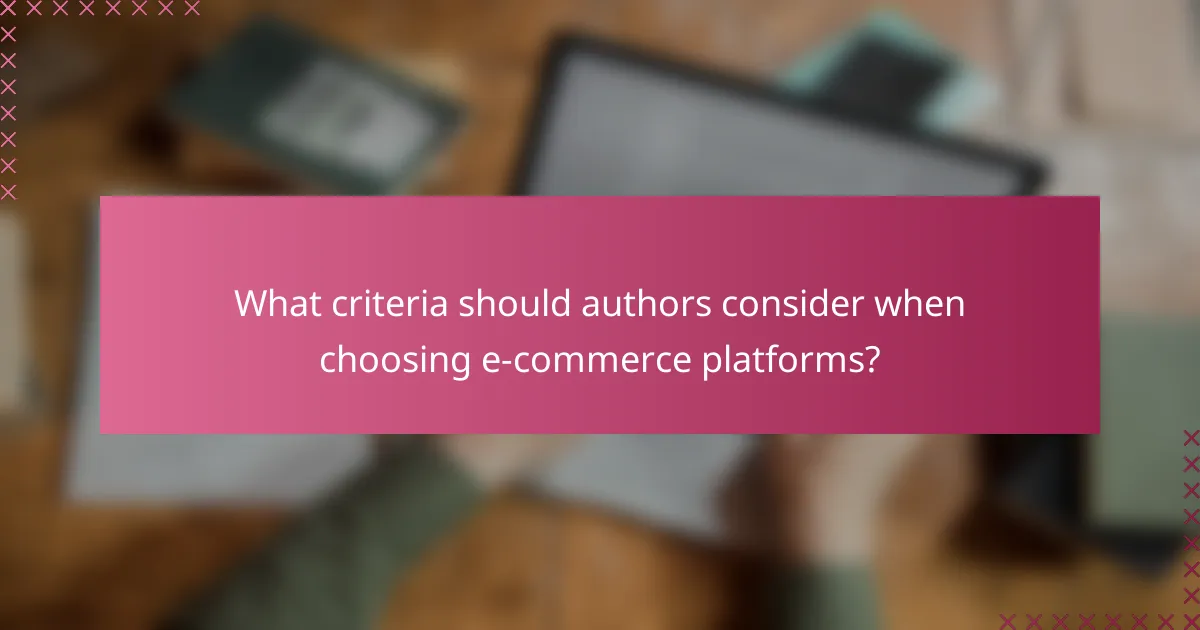Building a strong author platform is essential for establishing a distinct identity that resonates with your target audience. By showcasing your unique voice and engaging with your community, you can foster connections that enhance visibility and drive sales growth. Implementing effective strategies such as targeted marketing campaigns and exclusive content offerings will further solidify your presence and cultivate a loyal readership.

How can authors build a strong personal brand?
Authors can build a strong personal brand by establishing a distinct identity that resonates with their target audience. This involves showcasing their unique voice, creating a professional online presence, and actively engaging with their community.
Developing a unique author voice
Developing a unique author voice is essential for standing out in a crowded market. This voice should reflect your personality, writing style, and the themes you explore in your work. Consider what makes your perspective different and how you can convey that consistently across your writing and communications.
To refine your voice, write regularly and seek feedback from peers or writing groups. Experiment with different styles and tones until you find what feels authentic and engaging to your audience.
Creating a professional website
A professional website serves as the cornerstone of your author brand. It should include a clear biography, information about your books, and a blog or news section to keep readers updated. Aim for a clean, user-friendly design that reflects your style and makes it easy for visitors to navigate.
Invest in a domain name that matches your author name and consider using platforms like WordPress or Squarespace for easy setup. Ensure your website is mobile-friendly, as many users will access it from their phones.
Leveraging social media platforms
Social media platforms are powerful tools for building your author brand and connecting with readers. Choose platforms that align with your audience, such as Instagram for visual storytelling or Twitter for quick updates and interactions. Regularly share content that reflects your voice and engages your followers.
Engagement is key; respond to comments, participate in discussions, and collaborate with other authors or influencers. This not only builds community but also enhances your visibility and credibility.
Utilizing author branding tools
Utilizing author branding tools can streamline your branding efforts and enhance your online presence. Tools like Canva can help you create visually appealing graphics for social media, while Mailchimp can assist with email marketing campaigns to keep your audience informed about new releases and events.
Consider using analytics tools to track engagement on your website and social media, allowing you to adjust your strategies based on what resonates most with your audience. Regularly assess your branding efforts to ensure they align with your goals and audience expectations.

What are effective community-building strategies for authors?
Effective community-building strategies for authors include engaging directly with readers, creating interactive experiences, and participating in local events. These approaches foster connections, enhance visibility, and ultimately drive sales growth.
Engaging with readers through newsletters
Newsletters are a powerful tool for authors to connect with their audience. By sending regular updates, authors can share insights, upcoming releases, and exclusive content, keeping readers engaged and informed.
To maximize impact, consider segmenting your audience based on interests or reading habits. This allows for tailored content that resonates more deeply with specific groups, increasing open and click-through rates.
Hosting virtual book clubs
Virtual book clubs offer an interactive platform for authors to engage with their readers. By selecting a book and facilitating discussions, authors can create a sense of community and encourage deeper connections with their work.
Utilize platforms like Zoom or Discord to host these events, and promote them through social media and newsletters. Offering incentives, such as signed copies or exclusive Q&A sessions, can also boost participation.
Participating in local literary events
Local literary events, such as readings, signings, or festivals, provide authors with opportunities to meet readers face-to-face. These interactions can significantly enhance an author’s visibility and foster a loyal fan base.
Research events in your area and consider collaborating with local bookstores or libraries. Participating in panels or workshops can also position you as an authority in your genre, attracting more readers to your work.

How can authors drive sales growth through their platforms?
Authors can drive sales growth through their platforms by leveraging e-commerce solutions, targeted marketing campaigns, and exclusive content offerings. These strategies help build a loyal community while enhancing visibility and sales potential.
Implementing e-commerce solutions
Integrating e-commerce solutions into an author’s platform allows for direct sales of books and merchandise. Options include setting up an online store on a personal website or using platforms like Shopify or WooCommerce to manage transactions efficiently.
Consider offering various payment methods to accommodate different customer preferences, including credit cards, PayPal, and local options. Ensure that the checkout process is user-friendly to minimize cart abandonment.
Using targeted marketing campaigns
Targeted marketing campaigns can significantly enhance an author’s reach and sales. By utilizing social media ads, email marketing, and search engine optimization, authors can connect with specific audiences interested in their genre or themes.
Segment your audience based on demographics or reading preferences to tailor your messaging. Regularly analyze campaign performance to refine strategies and improve engagement rates.
Offering exclusive content and merchandise
Exclusive content and merchandise create a sense of value for fans and can drive sales. Consider offering limited edition books, signed copies, or unique merchandise related to your work, such as bookmarks or artwork.
Additionally, providing exclusive content like behind-the-scenes looks, early access to new releases, or special newsletters can encourage readers to purchase directly from your platform. This not only boosts sales but also fosters a stronger community connection.

What criteria should authors consider when choosing e-commerce platforms?
Authors should consider payment processing options, integration with social media, and ease of use and customization when selecting an e-commerce platform. These factors directly impact sales potential, audience engagement, and overall user experience.
Payment processing options
When evaluating e-commerce platforms, authors should look for diverse payment processing options that accommodate their audience’s preferences. Common choices include credit card payments, PayPal, and digital wallets like Apple Pay or Google Pay. Ensure the platform supports secure transactions and complies with relevant regulations, such as PCI DSS for credit card processing.
Additionally, consider transaction fees, which can vary significantly between platforms. Some may charge a flat fee, while others take a percentage of each sale. Aim for platforms that offer competitive rates to maximize your profits.
Integration with social media
Social media integration is crucial for authors looking to build a community and drive sales. A good e-commerce platform should allow seamless sharing of products on platforms like Facebook, Instagram, and Twitter. This can enhance visibility and engagement with potential readers.
Look for features such as social media login options, shoppable posts, and the ability to run targeted ads. These tools can help you reach a wider audience and convert followers into customers more effectively.
Ease of use and customization
The ease of use and customization options of an e-commerce platform can significantly affect your ability to manage your online store. Choose a platform that offers an intuitive interface, allowing you to set up your store quickly without extensive technical knowledge. User-friendly dashboards can save you time and reduce frustration.
Customization is also important, as it allows you to create a unique brand identity. Look for platforms that offer customizable templates and flexible design options. This will enable you to tailor your store’s appearance to reflect your personal style and resonate with your target audience.

How do authors measure the success of their platforms?
Authors can measure the success of their platforms through various metrics that reflect their branding, community engagement, and sales growth. Key indicators include website traffic, sales figures, and reader feedback, which together provide a comprehensive view of an author’s reach and impact.
Analyzing website traffic and engagement
Website traffic and engagement metrics are essential for authors to understand how well their platforms are performing. Tools like Google Analytics can help track unique visitors, page views, and average session duration, providing insights into user behavior.
Engagement metrics, such as bounce rates and time spent on site, indicate how effectively content resonates with visitors. A lower bounce rate and higher time on site suggest that readers find the content valuable, which can lead to increased loyalty and community building.
Tracking sales and conversion rates
Sales figures and conversion rates are critical for assessing the financial success of an author’s platform. Authors should monitor the number of books sold, revenue generated, and the conversion rate from website visitors to buyers. A typical conversion rate for online sales can range from 1% to 5% depending on the niche and marketing efforts.
Using tools like e-commerce analytics can help authors identify which marketing strategies are most effective. For instance, tracking sales from social media campaigns versus email newsletters can inform future promotional efforts.
Gathering reader feedback and reviews
Reader feedback and reviews are invaluable for authors looking to improve their platforms. Encouraging readers to leave reviews on platforms like Goodreads or Amazon can provide insights into what resonates with the audience and what needs improvement.
Authors can also gather qualitative feedback through surveys or social media polls. This direct communication can help authors understand their audience’s preferences and adjust their content or marketing strategies accordingly, fostering a stronger community connection.

What are the emerging trends in author platforms?
Emerging trends in author platforms focus on enhanced branding, community engagement, and sales growth. Authors are increasingly leveraging social media, personalized content, and data analytics to build their presence and connect with readers.
Branding Strategies
Effective branding strategies for authors involve creating a unique identity that resonates with their target audience. This includes developing a consistent visual style, tone, and messaging across all platforms. Authors should consider using professional design services for their websites and promotional materials to enhance their brand image.
Additionally, storytelling plays a crucial role in branding. Authors can share their personal journeys and writing processes to forge deeper connections with their audience. Engaging narratives can help differentiate an author in a crowded market.
Community Building
Building a community around an author’s work is essential for fostering loyalty and encouraging word-of-mouth promotion. Authors can utilize platforms like Facebook Groups, Discord, or Patreon to create spaces for readers to interact and share their thoughts. Regular engagement through Q&A sessions, live readings, or exclusive content can strengthen these communities.
Moreover, collaborating with other authors or influencers can expand reach and introduce new audiences. Joint events, webinars, or social media takeovers can be effective ways to tap into each other’s follower bases.
Sales Growth Techniques
Sales growth for authors often hinges on effective marketing and promotional strategies. Utilizing email marketing to keep readers informed about new releases, special offers, or events can significantly boost sales. Authors should aim to build an email list from the outset, offering incentives like free chapters or exclusive content.
Additionally, authors should consider leveraging platforms like Amazon KDP for self-publishing, which can provide valuable insights into sales trends and reader preferences. Regularly analyzing this data can help authors adjust their marketing strategies and optimize their sales efforts.
